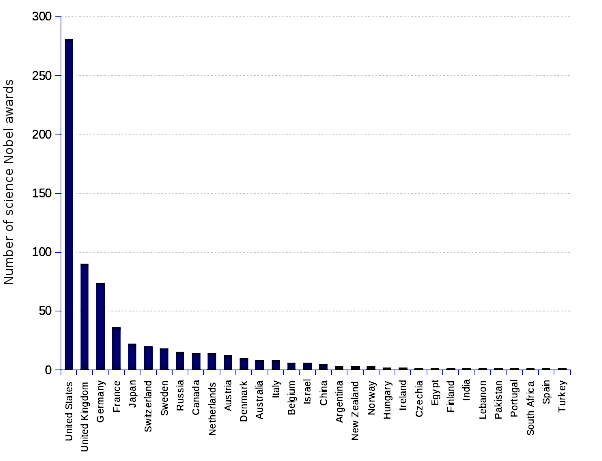areppim: information, pure and simple

European nations taken together received 324 or 47.7% of the Nobel prize awards for chemistry, physics and physiology or medicine. The United States and Canada grabbed 304 or 44.7%, Asia and the rest of the world won 47 or 7% and 5 or 0.7% of the awards respectively. Small nations such as Switzerland and Sweden sit among the top 10 heavyweights.
Mostly wealthy nations sit at the top of the rating, which begs a question. Are these nations prosperous because they enjoy a high scientific standing, or do they achieve scientific prowess because they have enough wealth to afford lavish spending in scientific education and research? Indeed Big Science became a capital-intensive activity, requiring huge investments in advanced technology, leading-edge engineering, and in manpower and administrative costs to keep numerous researchers busy in their scientific endeavors. It is revealing that the Nobel prize champion, the United States, harbors a significant number of non-US born Nobel prize winners (see list) who left their homeland to pursue their scientific work in a country wealthy enough to offer them the material conditions, employment time, laboratories, equipment, research assistants, funding, travel expenses, etc. required to perform high-grade research and interact with peers.
One should not forget a third possibility. There is likely a positive feedback loop between scientific advancement and economic prosperity in a capitalistic system. Science opens the road to business opportunities, which bring about prosperity, which in turn allows for more investment in knowledge, which in turn, etc.
![]() Take a look at the complete Nobel prize lists
Take a look at the complete Nobel prize lists
| Nobel Prizes Chemistry + Physics + Physiology or Medicine | ||
|---|---|---|
| Nation ¹ | Number of awards | Percent |
| Argentina | 3 | 0.4% |
| Australia | 8 | 1.2% |
| Austria | 12 | 1.8% |
| Belgium | 6 | 0.9% |
| Canada | 14 | 2.1% |
| China | 5 | 0.7% |
| Czech Republic | 1 | 0.1% |
| Denmark | 10 | 1.5% |
| Egypt | 1 | 0.1% |
| Finland | 1 | 0.1% |
| France | 39 | 5.7% |
| Germany | 74 | 10.9% |
| Hungary | 4 | 0.6% |
| India | 1 | 0.1% |
| Ireland | 2 | 0.3% |
| Israel | 6 | 0.9% |
| Italy | 8 | 1.2% |
| Japan | 22 | 3.2% |
| Lebanon | 1 | 0.1% |
| Netherlands | 14 | 2.1% |
| New Zealand | 3 | 0.4% |
| Norway | 3 | 0.4% |
| Pakistan | 1 | 0.1% |
| Portugal | 1 | 0.1% |
| Russia | 16 | 2.3% |
| South Africa | 1 | 0.1% |
| Spain | 1 | 0.1% |
| Sweden | 19 | 2.8% |
| Switzerland | 20 | 2.9% |
| Tunisia | 1 | 0.1% |
| Turkey | 1 | 0.1% |
| United Kingdom | 92 | 13.5% |
| United States | 290 | 42.6% |
| Total | 681 | 100.0% |
| ¹ Double nationals counted twice, once for each nationality. National of former Czechoslovakia appears under Czechia. Nationals of former Soviet Union appear under Russia. | ||
Sources: Nobel prize